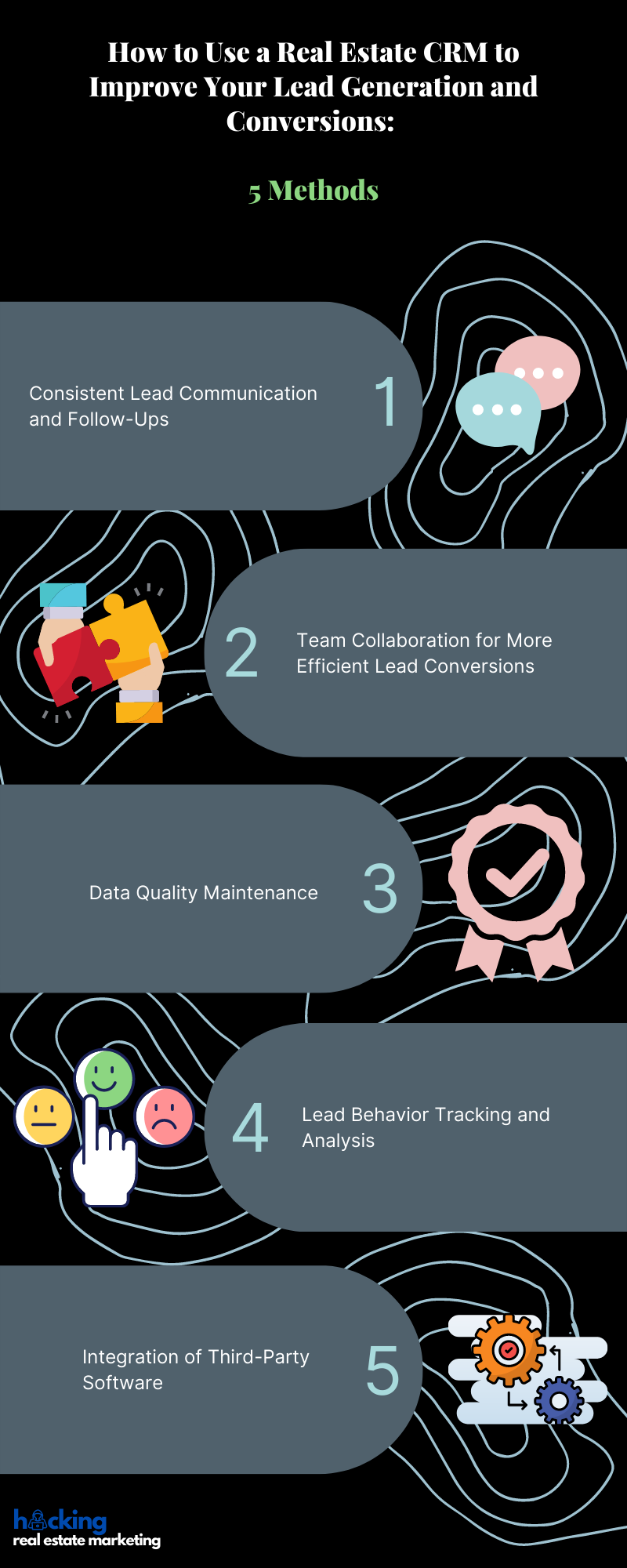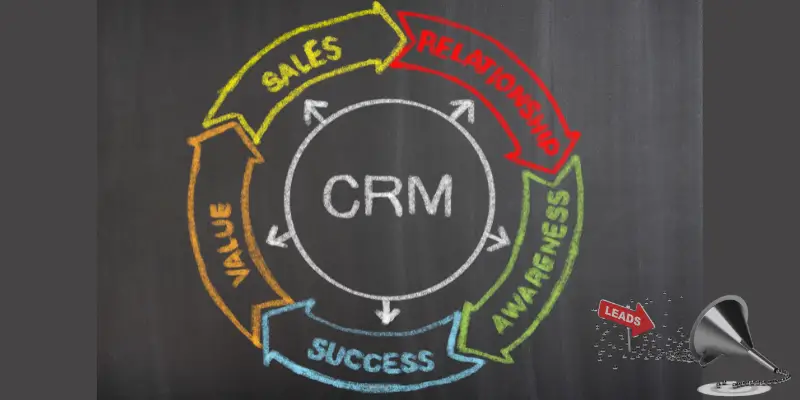Entering the world of CRMs, especially real estate CRMs can be overwhelming.
There is even a large share (not the majority, though) of real estate professionals who do not know what CRM is in the first place.
So, when you haven’t dealt much with real estate CRMs yet, you may wonder how you may benefit from them and, more so, how your lead generation process could benefit from them.
This article, therefore, will answer the question of how to use a real estate CRM to improve your lead generation.
I will cover…
- Real estate CRM statistics and benefits
- How a CRM is used in real estate
- 5 methods of how you can use a real estate CRM to improve your lead generation and conversions
Real Estate CRM Statistics and Benefits
In this and this article, I already explained what a real estate CRM is.
Here is a short recap: it is a software (more and more cloud-based) helping realtors and brokers manage their leads, client communication, properties, and transactions.
While there are not many specific real estate CRM statistics, we can apply more than enough general ones to the real estate industry, which is relevant to its uses and lead generation.
So, let’s get started…
Real estate agents with an annual income of over $100,000 use a CRM in 60% of cases.
In turn, those making less than $35,000 per year don’t use a real estate CRM in 65% of the cases (source).
Since 2020, there has been an increased use of CRMs on mobile devices (source).
When using a mobile CRM, half of the teams (50%) could improve their productivity (source), and 65% could reach their sales goals (source).
Regarding CRMs’ ROI, you can expect $8.71 for every dollar spent (source).
Revenue can be increased by 41% per sales rep (source).
So, this is in line with the first point of real estate agents making more than $100,000 annually using a CRM in 60% of the cases.
You will have better access to customer data, which is the opinion of 74% of businesses (source).
Internal team communication between sales reps can increase by 57% and customer retention by 27% (source).
And finally, the costs per lead can be reduced by 23% (source).
How Is a CRM Used in Real Estate
Let’s also look at the applications of CRMs in real estate.
Here, the situation is similar to the above statistics.
Not much reliable data on the specific application in real estate is available.
However, there is general data that likely applies also to real estate, as we have already seen.
According to this source, in descending order from most common to less common, CRMs are used the following:
- Generating new leads and keeping customers happy
- Customer support
- Contact management
- Automation (e.g., email marketing)
- Social media marketing
- Brand management
So, when we zoom out a bit and look at the different statistics from a bird’s eye view, we could distill the information to the following:
Real Estate CRMs can give you essential leverage regarding lead conversion rates.
It’s the tool to optimize the next level in your real estate funnel after the initial entry point (the first contact).
In other words, the benefits of using a real estate CRM start where the initial lead generation ends.
This leads to the next question…
How to Use a Real Estate CRM to Improve Your Lead Generation and Conversions: 5 Methods
So, from the above, we know that it’s all about conversion rate optimization in different parts of the sales funnel that comes after the initial lead has been generated using, for example, a lead magnet (e.g., a prospect enters your funnel because of a home valuation form).
Based on that, we can derive the following methods to use a real estate CRM optimally for lead generation and better conversions.
1) Consistent Lead Communication and Follow-Ups
You want to use your real estate CRM to establish consistent lead communication and follow-up tasks.
To use this technology to help you automate several lead-relevant tasks, you want to implement automated workflows related to incoming and current leads.
Depending on their awareness level (cold, warm, hot, etc.), you should be able to create individual workflows for the different real estate lead types.
This can include relevant follow-up tasks and reminders for the leads assigned to team members and partners (provided they exist, if not, it’s you as an individual agent).
Additionally, you want to set up relevant email campaigns for different lead segments.
Depending on the lead type, it can be individual or manual broadcasts or automated nurturing campaigns.
2) Team Collaboration for More Efficient Lead Conversions
Provided you are not an individual agent and have a team, you want to identify team members and partners that should be added to your real estate CRM so you can assign lead-relevant tasks to them.
Training your team, partners, or yourself in the real estate CRM (my article) you use may become necessary.
Why?
Because for most real estate CRMs, you will need time until you master all their features.
3) Data Quality Maintenance
Before using a real estate CRM, you may have contact data everywhere.
So, you will need to import existing contacts and assign them tasks and relevant follow-up and nurturing campaigns.
To get better conversion rates regarding email marketing, you want to segment and personalize these contacts or leads.
Most real estate CRMs nowadays have features such as tagging, so you can do that by tagging them accordingly (e.g., hot lead, warm lead, buyer, seller, quality score, etc.)
This leads me to another important point regarding data quality maintenance: scoring.
You also want to score and qualify the leads in the CRM and segment them accordingly so you can assign relevant tasks.
4) Lead Behavior Tracking and Analysis
Using your real estate CRM for lead behavior and tracking analysis will be essential to steadily improve your lead generation campaigns and their marketing channels.
So, you want to monitor the lead sources and conversion entry points (e.g., website form, call from a real estate sign, open house attendees’ list), their conversion rates, and other key marketing performance indicators.
You then should be able to assign this marketing performance data to a specific lead (e.g., John Doe, lead source: call from real estate sign ID XYZ).
The email marketing campaign you may run from the real estate CRM also needs to be monitored regarding its performance and optimized accordingly.
For example, you may find that a particular campaign has a low open rate, which may indicate an issue with the subject line copy or your email server due to high bounce rates.
Using the real estate CRM for consistent performance tracking and analysis will give have the basis to identify high-quality and/or high-value leads.
You can then label them and add relevant tasks.
Based on that, you will be able to sell smarter and better focus on the twenty percent of leads that likely bring in eighty percent of the results (think Pareto Principle).
5) Integration of Third-Party Software
Most real estate CRMs I came across in this and this article provide either in-house third-party software integration options or use integration software such as Zapier.
To reduce the overall friction and manual labor (manual data entering), you want to integrate as many third-party software tools as possible, especially when it’s software related to lead generation and conversion.
So, you want to integrate your MLS (leads may come from a single property page inquiry form) and your email marketing tools.
The latter may be necessary if the real estate CRM doesn’t offer an in-house solution.
You may also have a following on social media or want to grow an organic one to generate leads.
So, scheduling and automating social media posting is another functionality you want to integrate.
I will leave you with an overview graphic of the 5 methods to use a real estate CRM to improve your lead generation.

This article has been reviewed by our editorial team. It has been approved for publication in accordance with our editorial policy.
- Why Real Estate Conversion Rates Are 6-Times Below Average - March 21, 2024
- How to Manage Your Apartment Advertising Campaign - February 23, 2024
- Finding Marketing Channels for Apartment Advertising - February 12, 2024

